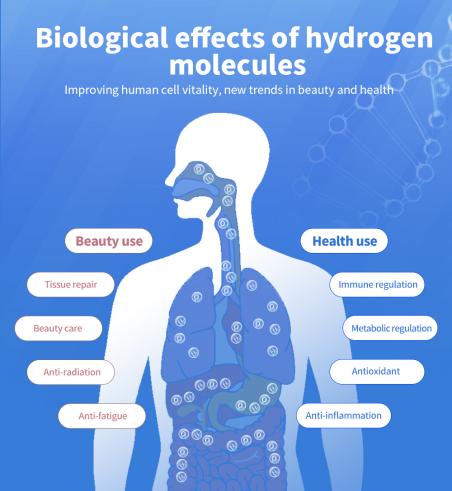Hydrogen: History and Health Benefits
 Suyzeko
Suyzeko
 Jul 18,2025
Jul 18,2025

Hydrogen: History and Health Benefits
Introduction
Hydrogen (H₂), the lightest and most abundant element in the universe, has long captured human interest. From early scientific discoveries to modern applications, the history of hydrogen is filled with innovation and breakthroughs. In recent years, hydrogen's applications in medicine and health have become a hot topic of research, particularly its potential benefits for human health. This article will review the development history of hydrogen, explore its effects on human health, and provide answers to frequently asked questions at the end.
The Development History of Hydrogen
1. Discovery and Early Research
The discovery of hydrogen dates back to the 16th century. Swiss scientist Paracelsus first observed gas generated from the reaction between metals and acids in experiments, but he did not clearly identify the gas. It was not until 1766 that British scientist Henry Cavendish formally isolated hydrogen as an independent gas and named it "flammable air." In 1783, French chemist Antoine Lavoisier named it "hydrogen," meaning "water-forming element."
2. Industrial Applications of Hydrogen
By the late 19th century, with the advancement of the Industrial Revolution, hydrogen began to be widely used in industrial production. For example, it was used in the synthesis of ammonia (Haber-Bosch process) and petroleum refining. Additionally, hydrogen was used to fill balloons, although it was later replaced by helium due to its flammability.
3. Hydrogen in Energy Exploration
Since the 20th century, hydrogen has gained attention as a clean energy source. The oil crisis of the 1970s prompted countries to seek alternative energy sources, and hydrogen, which produces only water when burned, was seen as an ideal clean fuel. In recent years, with the development of fuel cell technology, hydrogen's applications in transportation and energy storage have gradually expanded.
4. Breakthroughs in Medical Applications
In 2007, a team led by Professor Shigeo Ohta from Nippon Medical School published a paper in Nature Medicine, proposing for the first time that hydrogen has selective antioxidant properties and can neutralize harmful free radicals in the human body. This discovery sparked a wave of research into hydrogen's applications in medicine and health. Since then, hydrogen has been widely used in disease treatment, anti-aging, and health management.
The Benefits of Hydrogen to the Human Body
1. Selective Antioxidant Effects
The most notable biological property of hydrogen is its selective antioxidant effect. Free radicals (such as hydroxyl radicals) in the human body are a major cause of oxidative stress and various diseases. Hydrogen can selectively neutralize harmful free radicals while leaving beneficial ones (such as nitric oxide) unaffected, thereby protecting cells from oxidative damage.
2. Anti-Inflammatory Effects
Hydrogen can inhibit the release of inflammatory factors and reduce inflammatory responses. Studies have shown that hydrogen has significant therapeutic effects on inflammatory diseases such as arthritis, pneumonia, and enteritis.
3. Improvement of Metabolic Syndrome
Hydrogen can regulate blood sugar, lipids, and blood pressure, offering potential benefits for metabolic syndromes such as diabetes and obesity. Research has found that long-term consumption of hydrogen-rich water can reduce cholesterol and low-density lipoprotein levels in the blood.
4. Protection of the Nervous System
Hydrogen can cross the blood-brain barrier and protect the nervous system. Studies suggest that hydrogen has potential therapeutic effects on neurodegenerative diseases such as Alzheimer's and Parkinson's.
5. Anti-Aging Effects
By reducing oxidative stress and inflammation, hydrogen slows down the cellular aging process. Additionally, it promotes autophagy, helping to clear damaged organelles and maintain cellular health.
6. Enhanced Immunity
Hydrogen can regulate immune system function and enhance the body's resistance to pathogens. Research has shown that hydrogen can increase the activity of immune cells and reduce the risk of infection.

Frequently Asked Questions (FAQ)
1. Is Hydrogen Safe?
Hydrogen is a very safe gas. Its explosive concentration range in air is 4% to 75%, but in regular use (such as drinking hydrogen-rich water or inhaling low-concentration hydrogen), its concentration is far below the explosive limit, making it safe for use.
2. How Is Hydrogen Absorbed by the Human Body?
Hydrogen can be absorbed by the human body in various ways, including inhalation, drinking hydrogen-rich water, and hydrogen baths. Among these, drinking hydrogen-rich water is the most common method, as hydrogen can quickly enter the bloodstream through the digestive tract.
3. Does Hydrogen Have Side Effects?
Current research indicates that hydrogen has almost no side effects on the human body. It is a naturally occurring substance, and small amounts of hydrogen are also produced by bacteria in the human gut. Clinical trials have not shown any significant adverse reactions in healthy individuals or patients.
4. How Effective Is Hydrogen in Treating Diseases?
Hydrogen has potential therapeutic effects on various diseases, but its mechanisms and efficacy require further research. Currently, hydrogen is primarily used as an adjunct therapy and should not replace traditional medical treatments.
5. How to Choose Hydrogen Products?
Common hydrogen products on the market include hydrogen water machines, hydrogen inhalers, and hydrogen water bottles. When selecting a product, pay attention to its hydrogen concentration, safety, and brand reputation. It is recommended to choose products certified by authoritative organizations and follow the instructions for use.

Conclusion
Hydrogen, as an ancient yet modern element, has witnessed the progress of human technology throughout its development history. From early scientific discoveries to modern medical applications, hydrogen is gradually revealing its unique value. With further research, the prospects for hydrogen's applications in health and wellness will continue to expand. We hope this article provides valuable insights and helps you better understand hydrogen and its benefits to the human body.



 Home
Home Constant Current: The Key to Efficient Hydrogen Production
Constant Current: The Key to Efficient Hydrogen Production 











